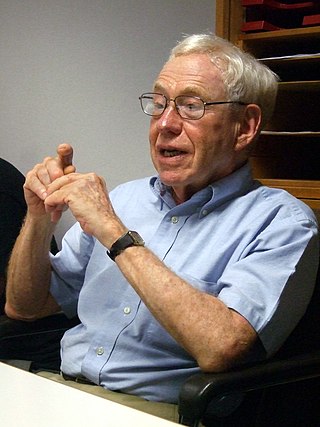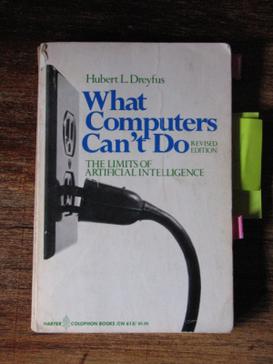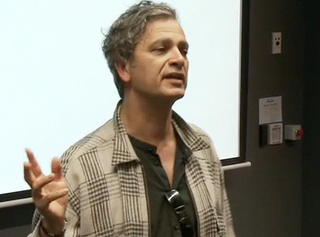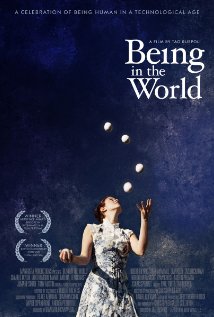
Martin Heidegger was a German philosopher who is best known for contributions to phenomenology, hermeneutics, and existentialism. He is often considered to be among the most important and influential philosophers of the 20th century.

Being and Time is the 1927 magnum opus of German philosopher Martin Heidegger and a key document of existentialism. Being and Time had a notable impact on subsequent philosophy, literary theory and many other fields. Though controversial, its stature in intellectual history has been compared with works by Kant and Hegel. The book attempts to revive ontology through an analysis of Dasein, or "being-in-the-world." It is also noted for an array of neologisms and complex language, as well as an extended treatment of "authenticity" as a means to grasp and confront the unique and finite possibilities of the individual.

Hubert Lederer Dreyfus was an American philosopher and professor of philosophy at the University of California, Berkeley. His main interests included phenomenology, existentialism and the philosophy of both psychology and literature, as well as the philosophical implications of artificial intelligence. He was widely known for his exegesis of Martin Heidegger, which critics labeled "Dreydegger".
Neo-Luddism or new Luddism is a philosophy opposing many forms of modern technology. The term Luddite is generally used as a pejorative applied to people showing technophobic leanings. The name is based on the historical legacy of the English Luddites, who were active between 1811 and 1817.
Gestell is a German word used by twentieth-century German philosopher Martin Heidegger to describe what lies behind or beneath modern technology. Heidegger introduced the term in 1954 in The Question Concerning Technology, a text based on the lecture "The Framework" first presented on December 1st 1949, in Bremen. It was derived from the root word stellen, which means "to put" or "to place" and combined with the German prefix Ge-, which denotes a form of "gathering" or "collection". The term encompasses all types of entities and orders them in a certain way.
The philosophy of technology is a sub-field of philosophy that studies the nature of technology and its social effects.

Herman Johan "Hans" Achterhuis is Professor Emeritus in Systematic Philosophy at the University of Twente, The Netherlands. For now his research concerns particularly social and political philosophy and philosophy of technology.
Albert Borgmann was a German-born American philosopher, specializing in the philosophy of technology.
Martin Heidegger, the 20th-century German philosopher, produced a large body of work that intended a profound change of direction for philosophy. Such was the depth of change that he found it necessary to introduce many neologisms, often connected to idiomatic words and phrases in the German language.

Hubert Dreyfus was a critic of artificial intelligence research. In a series of papers and books, including Alchemy and AI (1965), What Computers Can't Do and Mind over Machine (1986), he presented a pessimistic assessment of AI's progress and a critique of the philosophical foundations of the field. Dreyfus' objections are discussed in most introductions to the philosophy of artificial intelligence, including Russell & Norvig (2021), a standard AI textbook, and in Fearn (2007), a survey of contemporary philosophy.

The Question Concerning Technology is a work by Martin Heidegger, in which the author discusses the essence of technology. Heidegger originally published the text in 1954, in Vorträge und Aufsätze.
Philosophy of design is the study of definitions of design, and the assumptions, foundations, and implications of design. The field, which is mostly a sub-discipline of aesthetics, is defined by an interest in a set of problems, or an interest in central or foundational concerns in design. In addition to these central problems for design as a whole, many philosophers of design consider these problems as they apply to particular disciplines. Although most practitioners are philosophers of aesthetics, several prominent designers and artists have contributed to the field. For an introduction to the philosophy of design see the article by Per Galle at the Royal Danish Academy.
World disclosure refers to how things become intelligible and meaningfully relevant to human beings, by virtue of being part of an ontological world – i.e., a pre-interpreted and holistically structured background of meaning. This understanding is said to be first disclosed to human beings through their practical day-to-day encounters with others, with things in the world, and through language.

Nikolas Kompridis is a Canadian philosopher and political theorist. His major published work addresses the direction and orientation of Frankfurt School critical theory; the legacy of philosophical romanticism; and the aesthetic dimension(s) of politics. His writing touches on a variety of issues in social and political thought, aesthetics, and the philosophy of culture, often in terms of re-worked concepts of receptivity and world disclosure—a paradigm he calls "reflective disclosure".

Technology and the Character of Contemporary Life: A Philosophical Inquiry is a 1984 book by Albert Borgmann, an American philosopher, specializing in the philosophy of technology. Borgmann was born in Freiburg, Germany, and is a professor of philosophy at the University of Montana.
Taylor Carman is an American philosopher. He is a professor of philosophy at Barnard College, Columbia University.

Being in the World is a 2010 documentary film directed by Tao Ruspoli. The film is based on Martin Heidegger's philosophy and is inspired by Hubert Dreyfus. It features a number of prominent philosophers.

Iain D. Thomson is an American philosopher and Professor of Philosophy at the University of New Mexico (UNM). He is a well-known expert on Martin Heidegger.